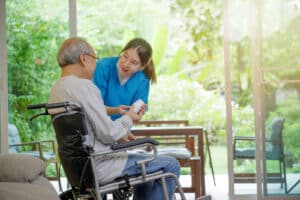Skilled Nursing Care and the End Stages of ALS

ALS: Skilled Nursing Care Upper Darby PA
ALS (amyotrophic lateral sclerosis) is more commonly known as Lou Gehrig’s disease. It affects about 5,000 people per year, is more common in men between the ages of 40 and 70, and has no cure. As the average lifespan after diagnosis is three years, it’s not a lot of time. In the early stages, you were providing the care your dad needed, but those care needs are becoming too advanced. It’s time to look at the benefits of skilled nursing care as he reaches the end stages.
How Does ALS Progress?
The stages of ALS are broken down into four sections.
- Stage 1: The beginning of the disease where muscles weaken in some or become rigid and cause spasms in others. Cramping, fatigue, and muscle twitches are common.
- Stage 2: The second stage usually causes painful muscle contractions that impact mobility. Dry mouth, emotional changes, and swollen joints also occur.
- Stage 3: This is the start of the late stages. Muscle paralysis is common, and breathing difficulties occur. Oxygen treatments are often required, which leads to the need for skilled nursing care. Chewing and swallowing food is also difficult, so a feeding tube and IV fluids are also something that has to be considered.
- Stage 4: In the last stage of ALS, aspiration pneumonia is a major risk as swelling can affect the throat muscles and lead to choking. The lungs also typically stop working effectively. End-of-life care focuses on keeping your dad comfortable.
What Can Skilled Nurses Do?
You will find that skilled nurses are helpful throughout the progression of ALS. The biggest help is going to come from health assessments, medication administration, IV lines, pain management, and sometimes supervised oxygen treatments.
One of the most important roles of skilled nursing care with ALS is that they can monitor your dad’s health. They’ll track his pulse, breathing rate, oxygen saturation, and blood pressure. They can assess his pain levels and muscle rigidity and talk to his doctor.
If the pain is severe, a nurse can set up an IV line and get him the medications he needs to ease the pain. IV lines are also useful in making sure your father is properly hydrated and has the nutrients he needs. If a feeding tube is needed, that’s another option.
Your dad’s nurse will monitor his oxygen saturation and keep in touch with his doctors. If there are significant dips, supervised use of oxygen may be offered. It has to be carefully monitored as your dad may not properly expel carbon dioxide, which can increase headaches. Nurses can draw blood to check his carbon dioxide levels.
As your dad nears the end stages of ALS, make sure he’s supported with the skilled nursing care that will ensure he’s as comfortable as possible. Skilled nursing care starts with a phone call, so have your questions ready when you call or fill out an online form to learn more.
If you or an aging loved one are considering Skilled Nursing Care in Upper Darby, PA please contact the caring staff at True Direct Home Health Care today.
- How Home Health Providers Offer Education Amidst Physical Health Changes - March 5, 2024
- Spring Activities for Seniors - February 21, 2024
- How to Help an Older Loved One with Cataracts? - February 6, 2024
